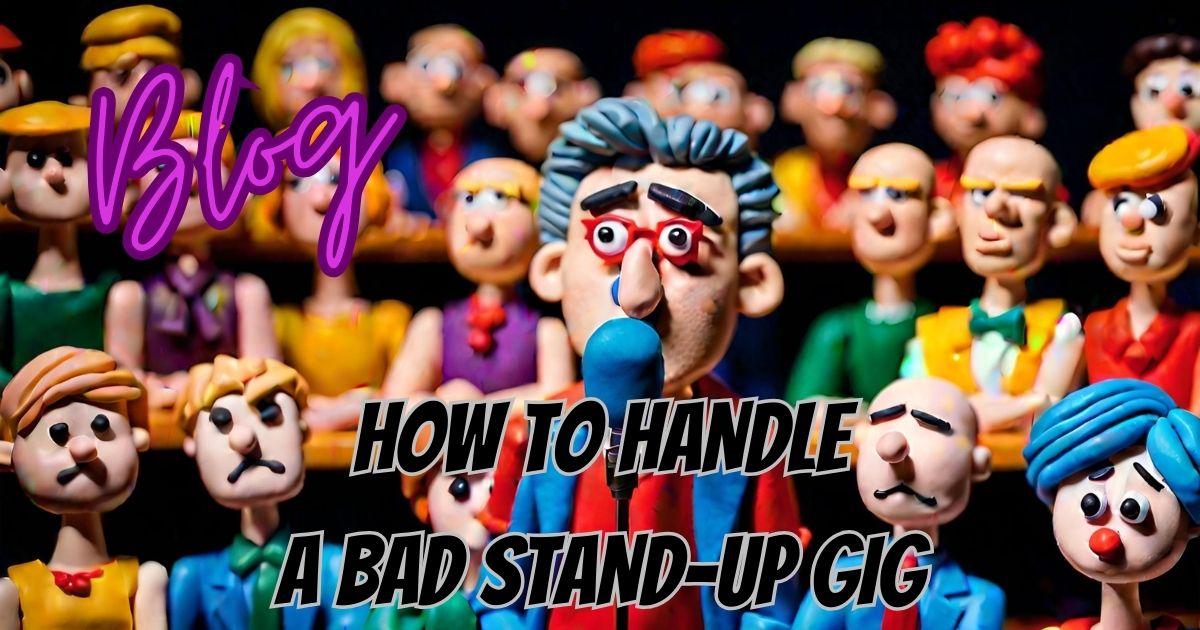How to Handle a Bad Stand-Up Gig

Everyone who has ever performed stand-up, at least a few times, has had a bad gig.
Indeed, they have all had lots of bad gigs.
It comes with the territory.
Therefore, it’s helpful that those who perform have a grasp on methods to handle a “quiet” set, AKA, Dying on your Bootie.
It would be glib of me to suggest that comedians just “shake it off”. Even though that ability would be entirely desirable, it doesn’t consider those tricky human emotions such as embarrassment, disappointment and frustration.
Unless one is a psychopath who doesn’t have to handle any such emotions (and there are usually a few on the scene), tactics are needed to soothe the journey. I doubt that any single method could be a complete solution.
Using a few of them together will also fall short of being a complete solution. Though surely more effective than one or none.A laughter-free set can leave one feeling very alone. Please understand that is normal. The reality is, crashing on-stage is an essential experience that only comedians know and can relate to. In a twisted way, it’s a hidden bond between performers. While it may feel lonely, it is in fact a shared experience. Simply one that is shared at different times and places.
Pain is a way of telling us to course correct.
Remind yourself, after a bad gig, that no one really cares as much as you
If eradicating a sense of humiliation is impossible, then our focus will ideally shift to framing and mitigating that pain.
If a stage death doesn’t bring negative feelings, then it could imply something.
Possibly, that the act does not really care about their audience or their performance. If this is the case, then what’s the point in gigging at all?
It could be, that the open mic comedian has not even recognised that they raised no laughter. Over and again, I have been amazed at performers who died a death on my stage, right in front of me, just minutes earlier, and would come over and cheerfully ask me for the opportunity to perform a longer set the next time.
The former doesn’t care about others.
The latter can only focus on their deluded self-perception.
These are the outliers. They never improve, and thus, avoid all potential future successes in the comedy game.
So now, let’s focus on the majority of acts who sit between these extremes.
We’re talking of performers who generate ideas, write them down, work them up, re-write, edit, rehearse, memorize, travel across town, give up an evening for a few unpaid minutes of stage time… all in the pursuit of the exquisite high of making strangers laugh.
Everyone who has ever gained those laughs, knows that it is a very special reward indeed. Worth all the work.
Know this. There is always more to learn from a gig that went badly then a gig that went well.
Following the next rough gig, remind yourself of this. Then start the postmortem. Knowing it went badly is just the starting point. The bad gig is a most powerful opportunity.
Observe the awful ache of a dreadful gig. Use it as fuel for improvement
The savvy performer will of course be recording every one of their sets. Uncomfortable as it might be, review it. Joke-by-joke. Ask yourself what went wrong? Joke-by-joke.
Watching oneself in much the same way as the audience saw you is incredibly instructive. There are so many potential fixes that become apparent upon review.
· Was the punchline mumbled? Thus, the crowd could not possibly get the gag and laugh.
· Does it become clear that there are way too many unnecessary words and some editing is in order?
· Is the topic a contentious one and the crowd aren’t “going there” with you, given the entirely average attached punchline?
· Is the verbal tone in conflict with the topic? Such as a gleeful delivery to a dark issue.
· Is your set packed with “Umms”, “Erms” and “Aaahs” that simply deflate the whole experience?
· Do you have the air of someone who would rather be anywhere else but here?
· Is your opening gag so weak that it has a sabotaging effect on all that follows?
Quite likely, more than one of these examples, and others that are not listed here, will, at times, be true. Congratulations!
Problems identified. Some immediate and diligent work means that improvements, fixes, are swiftly approaching.
The agony of a bad gig should be transformed into inspiration. After all, it’s a truth for all humans that we are motivated to action by just two conditions:
· To move away from something that is objectionable
· To move toward something that is desirable
Utilize the disciplining burn of a bad gig. For it brings both elements into sharp, compounded relief.
Observe the awful ache of a dreadful gig. Use it as fuel for improvement, move away…
Visualize the perfect set. Crowd roaring, rolling laughter, the joyful flow of bringing great gags to a thrilled crowd. Move toward…
Of course, it is near impossible to move from the former to the latter in just a gig or three. However, significant steps in the ideal direction can be achieved rather quickly.
You’ll never hear one comedian ask another to tell them about their best gig. We only want to hear the humbling horror stories
There are a lot of errors that new comedians make. For there is a lot to learn and understand. Taking a couple of Coaching sessions, or jumping on a course, can highlight some powerful “Do’s and Don’ts”. (If you aren’t already aware, I provide both solutions, just sayin’…)
An online course can be purchased for about the same price as attending 4 or 5 open mic nights. Also requiring considerably less time. It is certain that more will be learned from the course than could ever be learned in such a small number of live gigs. Help is available to diminish the
dis-spiriting, hard, horrible gigs and move efficiently towards greater success.
Remind yourself, after a bad gig, that no one really cares as much as you. As it should be. The audience did not pay since it’s open mic, they are not so invested, they can handle an act in a flow of performers not doing well.
As a performer, there is a sweet spot for caring. Care too much and you’ll become unreasonably unhappy and for too long. Don’t care enough and you’ll miss out on the stinging fuel that inspires you onward.
The other comedians will possibly empathise with a bad set as they have been there too. Just as likely, some will be quietly delighted/grateful that you have ensured they won’t be the worst act on the bill tonight.
There is no such thing as a truly worthless gig. At worst, it can be used as an example of what not to do
Regardless, your peers won’t be judging too hard… especially as they will have an insight as to what you are trying to do even if it’s not yet working.
Besides, you’ll never hear one comedian ask another to tell them about their best gig. We only want to hear the humbling horror stories.
Once again, that’s human nature. Did you ever come back from a holiday and tell your friends how the resort was perfect; the food was great and everything went smoothly? Did you find no one cared or asked any questions?
Then the holiday where you suffered total sunburn, got mugged and suffered an “upset stomach” in the swimming pool… your friends and family can’t get enough of those details.
Bad gigs build your psychological armour for persisting with comedy, but also, to some degree, for dealing with the slings and arrows of life itself.
Horrible sets should inspire you to do whatever you can to get better.
Remember, there is no such thing as a truly worthless gig. At very worst, it can be used as an example of what not to do.
Finally, in stand-up there’s a concept known as “Millican’s Law”. Which I believe was coined by the British stand-up, Sarah Millican.
The beauty of this “law” is that it works both ways. Not only does it limit the negative feelings following a dreadful show, incredibly, but it also reins in the worst instincts of our ego when the gig went great and we crushed it.
I am paraphrasing, but in essence, “Regardless how the gig went, by 11am the following day, you must let the associated feelings go. Good or bad. Whatever reward or punishment the emotions brought; the lesson will have been observed. Wipe the slate clean and prepare to be better on the next gig”.
Bad gigs are the unavoidable fuel to help us work towards growth. Without bad gigs early, there can be no great gigs later. It’s all part of the process.
Move away… move towards…
Good Luck!
All photos courtesy of Steve Best at www.stevebest.com
Online classes for comedians at every level of experience
Learn and practise with the most talented comedians
Free open mic comedy, with top quality headline comedians
For stand-up comedians
For creative agency teams
Stand-up skill set. Stand-out results
Small print
Contact
We Are Funny Project Limited, 61 Bridge Street, Kington, HR5 3DJ, is registered in England and Wales, company number 08537398.
Copyright © We Are Funny Project Limited. All rights reserved.

